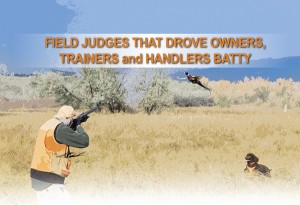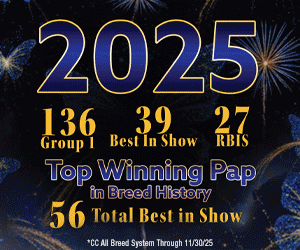Field Judges That Drove Owners, Trainers and Handlers Batty
Click here to read the complete article
 By Chris Robinson
By Chris Robinson
Looking at the number of entries in AKC, HRC/UKC, NSTRA, NAVHDA et. al. tests, it is clear that a considerable number of sporting dog owners participate in these events. If you are one of these participants, sooner or later, it’s a good bet that you will run into judging that, at best, will leave you shaking your head in bewilderment and, at worst, leave you furious. For folks with show dogs, this state of affairs is nothing new but at least in the show ring, where all judging is subjective, owners and handlers know what they’re getting into when they plunk down the entry fee.
However, in field tests, just as in most performance activities, the results are, or should be, pretty cut and dried. The dog either does what’s required to pass the test or it doesn’t. But, the devil, as always, is in the details. With entry fees topping out at more than $100 in retriever hunt tests, not counting travel expenses or handling fees if the dog is being handled by a professional, owners and trainers believe, rightly it would seem, that they’re entitled to competent judging.
Part of the problem is that the people who would be the best candidates to be judges are not the ones judging. They are running their dogs or in the case of professional trainers, their clients’ dogs. Another issue is that way too many hunt test judges have never actually hunted with their dogs and yes, actual hunting experience is very useful for a hunt test judge because it provides a significant addition to the framework of what dogs are capable of doing under various weather and terrain conditions, assuming a person is reasonably observant.
This is not to say that there aren’t good hunt test judges. There are a lot of very fine judges doing what can only be described as a thankless job. It’s always too hot, too cold, too wet, too dry, too buggy or a combination of these miseries. Often, with retriever or spaniels tests, there is inadequate staff to do a proper test and it also definitely takes a certain type of temperament to be a good judge. But, putting all this aside, there’s really no excuse for some of the things we see from judges in the field and I say this as someone who has seen the problems from both sides, having been successful in the field with both retrievers and pointing breeds as well as having judged all three types of hunting tests for more than 15 years. So here, in no particular order, are four of the more egregious judging sins that drive trainers, handlers, and owners to distraction.
1. Judges who don’t know the rules or deliberately ignore them.
Click here to read the complete article
Short URL: http://caninechronicle.com/?p=216176
Comments are closed












